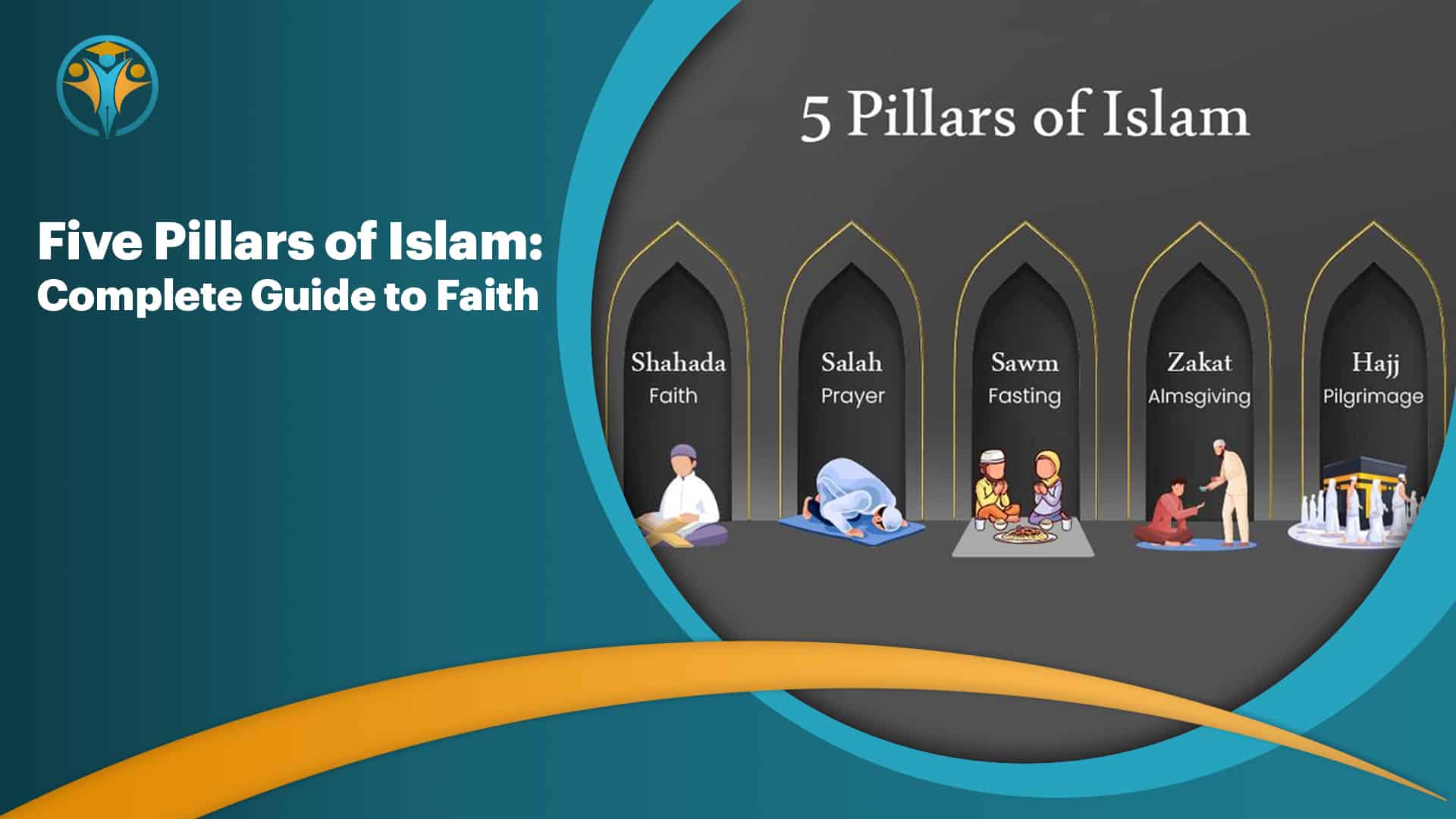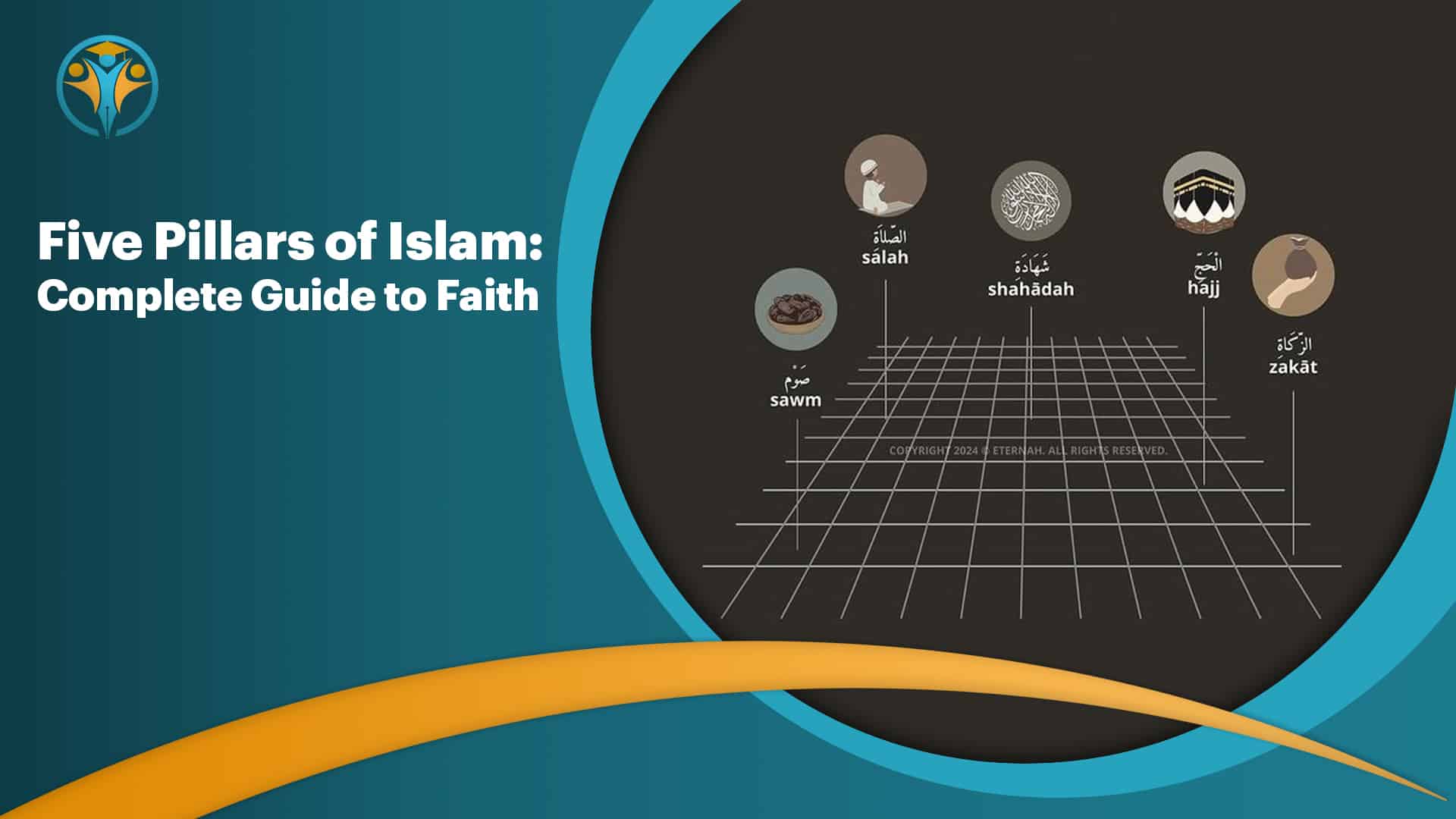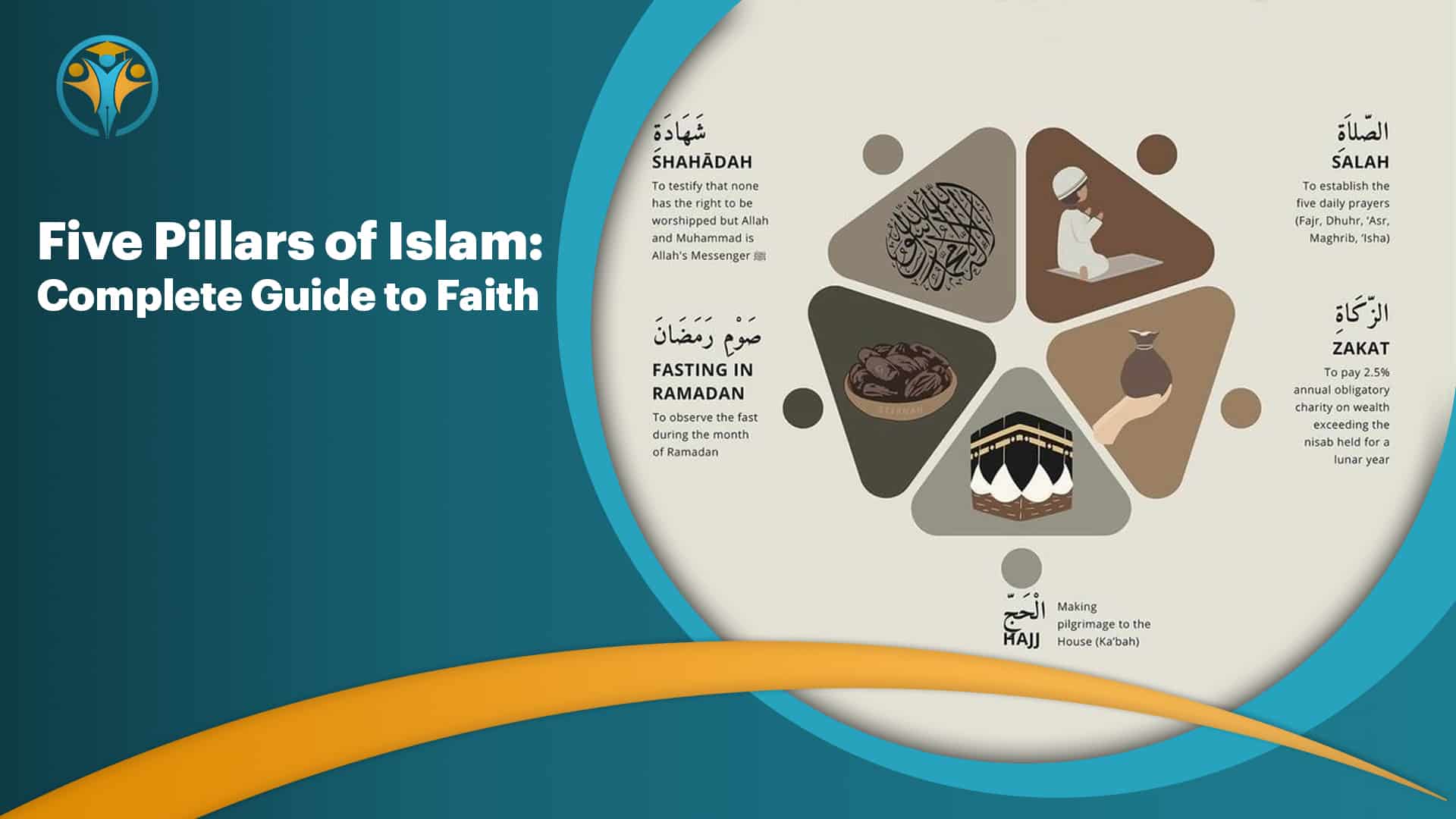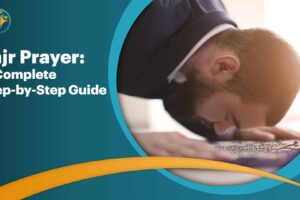
Five Pillars of Islam: Complete Guide to Faith
The five pillars of Islam are the core practices of the Islamic faith are Shahada (declaration of faith), Salat (prayer), Zakat (almsgiving), Sawm (fasting), and Hajj (pilgrimage).
These pillars which Islam is built form the foundation of Muslim life and are obligatory for all Muslims.
These Five Pillars of Islam represent the basics that every Muslim must adhere to and provide a comprehensive framework for Islamic worship and living.
Each of the Five Pillars of Islam embodies an important aspect of Islamic life, from belief in monotheism to helping those in need.
Whether you’re a practicing Muslim or someone eager to understand Islam more deeply,
This article will walk you through these sacred duties in an easy and accessible manner.
It is especially useful for parents, children, adults, and beginners seeking to build their understanding of Islam’s core teachings.
Five Pillars of Islam Meaning
The term Five Pillars of Islam refers to the five essential practices that form the bedrock of a Muslim’s faith and life.
These five obligations of Islam are more than ritual; they are acts of devotion and obedience that strengthen a Muslim’s relationship with Allah.
The word “pillar” symbolizes support, and just like physical pillars hold up a building, these spiritual obligations uphold a Muslim’s religious life.
Each pillar reflects a different aspect of Islamic belief and practice.
They are pillar Shahada (faith), pillar Salah (prayer), Zakat (charity), Sawm (fasting), and Hajj (pilgrimage) to Mecca.
Collectively, the Five Pillars of Islam (Shahada (faith), Salah (prayer), Zakat (charity), Sawm (fasting), and Hajj (pilgrimage) to Mecca) encourage both inner spiritual growth and active social responsibility.
By fulfilling these obligations, Muslims demonstrate their submission (Islām) to Allah’s will.
And their love for the Prophet Muhammad (pbuh), and their commitment to the Islamic way of life.

Five Pillars of Islam in English
The Five Pillars of Islam are the foundation upon which Islam is built.
They are the declaration that there is no god but Allah and that Muhammad is the Messenger of Allah, establishing prayer, paying zakat, fasting during Ramadan, and making the pilgrimage to the House of God for those who can afford it.
To help readers grasp the concept clearly, here are the Five Pillars of Islam translated and explained in English:
Shahada (Faith or Declaration of Faith):
The testimony that there is no god but Allah, and Muhammad is His messenger.
This is the Muslim profession of faith of the Islamic faith, declaring belief in the oneness of God and the finality of the Prophet Muhammad (pbuh).
Salah (Prayer):
Muslims are required to pray five times a day at specific times: salat Fajr, salat Dhuhr, salat Asr, salat Maghrib, and salat Isha.
These (salah) Prayers connect Muslims directly with their Creator and form a vital part of their spiritual routine.
Zakat (Charity or Alms giving):
Almsgiving (Zakat or charity) is an obligatory act of giving a portion, 2.5% of one’s wealth, to those in need.
It is a practical expression of compassion, purifying wealth and supporting the broader community.
Sawm (Fasting during Ramadan):
Fasting (saum) from dawn until sunset during the month of Ramadan.
This act of worship teaches self-control, empathy for the poor, and devotion to Allah.
Hajj (Pilgrimage to Mecca):
Hajj (Pilgrimage to Mecca) is a once-in-a-lifetime journey for Muslims who are physically and financially able.
The Hajj (pilgrimage) symbolizes unity, equality, and submission to Allah’s command.
These pillars are not just abstract concepts; they are key obligations that are practiced by Muslims worldwide across all aspects of life, from rituals to lifelong commitments in Islam.

What are the Five Pillars of Islam?
The Five Pillars of Islam are Shahada (the declaration of faith), Salah (five prayers), Zakat (charitable giving), Sawm (fasting), and Hajj (pilgrimage).
The five pillars of Islam are the foundation of a Muslim’s faith and daily life, core beliefs and practices of Islam that every Muslim is required to follow.
Each one reflects a unique form of worship and devotion to Allah, helping Muslims grow spiritually, and build discipline.
The five pillars of Islam are not just ritual, they are essential acts that shape the beliefs, actions, and purpose of a Muslim’s journey through life.
Let’s explore each of these pillars more deeply to understand their importance and the spiritual beauty they bring to a Muslim’s life.
-
Shahada (Declaration of Faith):
The Shahada (Declaration of Faith) is the most fundamental expression of Islamic belief.
Shahada is the first step for anyone entering Islam and the foundation of faith in Islam.
By reciting the Shahada or tashahhud, “Ashhadu an la ilaha illa Allah, wa ashhadu anna Muhammadu rasoolu Allah”, a person bears witness to the oneness of God and the prophethood of Muhammad.
The Shahada testimony of faith is the Muslim identity and underpins all other Islamic practices.
-
Salah (Prayer):
Salah (Prayer) is the act of performing five daily prayers.
Prayer (Salah) times are set at specific intervals, including recitation from the Qur’an, physical movements like bowing and prostration, and supplication.
The discipline of Salah (Prayer) strengthens faith, instills inner peace, and keeps the heart aligned with God’s guidance.
-
Zakat (Charity):
Zakat is an obligatory form of charity that purifies wealth and assists the less fortunate.
Muslims are required to give 2.5% of their savings each year to those in need.
Zakat reinforces social equality, compassion, and a strong sense of community support.
Almsgiving or Zakah isn’t just a donation; it’s a duty that ensures wealth circulates fairly in society and that no one is left behind.
-
Sawm (Fasting):
Sawm (Fasting) is abstaining from food, drink, and sinful behaviors.
During the month of Ramadan, Muslims fast from dawn to sunset.
Sawm (Fasting), called Sawm, trains the soul in discipline, encourages empathy for the hungry, and renews one’s relationship with Allah.
The experience is deeply spiritual and ends with the joyous celebration of Eid al-Fitr.
-
Hajj (Pilgrimage):
Hajj is the pilgrimage to the holy city of Mecca in Saudi Arabia.
Hajj (Pilgrimage) is required once in a lifetime for all physically and financially capable Muslims.
Performed during specific days in the Islamic calendar, Hajj includes rituals such as Tawaf (circling the Kaaba), standing at Arafat, and symbolic acts like the stoning of the devil.
Reflects the unity of Muslims, regardless of race, nationality, or status.
It’s a physical and spiritual journey that signifies complete surrender to Allah.

Pillars of Islam for Kids.
Teaching the Five Pillars of Islam to kids is one of the most essential steps in raising confident and faithful young Muslims.
The challenge is not just to explain each pillar but to bring them to life in a fun, engaging, and age-appropriate way.
Children learn best through stories, hands-on activities, and real-life examples.
The concept of Shahadah can be introduced as learning to say the Kalimas, while Salah (Prayer) can start with teaching them how to perform wudu (ablution) and memorize short prayers.
Parents can make Zakat relatable by encouraging children to share their toys or save money to donate.
During Ramadan, even young kids can try short fasting periods or help prepare Iftar meals.
Teaching about Hajj can be interactive with videos, models of the Kaaba, or simple role-play activities.
By simplifying the meanings and incorporating them into a child’s daily life, the Pillars of Islam become more than teachings—they become a beloved part of a child’s identity.
Why Choose Super Muslim Academy to Learn the Pillars of Islam
Leading platform Super Muslim Academy for Islamic education, tailored to all age groups, especially children and beginners.
They offer structured lessons, engaging content, and a user-friendly approach to teaching the Five Pillars of Islam.
Their curriculum is built by experts in Islamic studies and Arabic, and child education to learn Quranic Arabic Online.
With interactive videos, story-based lessons, and downloadable resources, students are encouraged to learn not just the ritual prayers but the meaning and beauty behind each pillar.
Parents trust Super Muslim Academy because it supports Islamic values, promotes moral development, and creates a love for God and the Prophet from an early age.
Whether you’re introducing your child to the importance of daily prayers, explaining the importance of Ramadan fasting, or walking them through their first understanding of Zakat and Hajj.
Plus, with features like progress tracking, reward to learning, and opportunities to sponsor an orphan or support charitable causes.
Super Muslim Academy doesn’t just teach Islam, it helps build Muslims who live by it.

